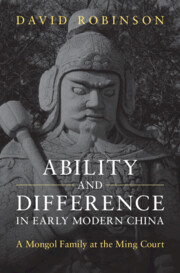Refine search
Actions for selected content:
632 results
Beyond innumeracy: measuring public misperceptions about immigration
-
- Journal:
- Political Science Research and Methods , First View
- Published online by Cambridge University Press:
- 17 November 2025, pp. 1-18
-
- Article
-
- You have access
- Open access
- HTML
- Export citation
Immigrants Against Immigration: British Ethnic Minority Brexit Voter Attitudes to Immigration
-
- Journal:
- Journal of Race, Ethnicity and Politics , First View
- Published online by Cambridge University Press:
- 11 November 2025, pp. 1-26
-
- Article
-
- You have access
- Open access
- HTML
- Export citation
Anatomy of elite and mass polarization in social networks
- Part of
-
- Journal:
- Network Science / Volume 13 / 2025
- Published online by Cambridge University Press:
- 10 November 2025, e18
-
- Article
-
- You have access
- Open access
- HTML
- Export citation
Regional Labor Markets, Residential Mobility, and Anti-Immigration Sentiment
-
- Journal:
- British Journal of Political Science / Volume 55 / 2025
- Published online by Cambridge University Press:
- 10 November 2025, e157
-
- Article
-
- You have access
- Open access
- HTML
- Export citation
Wha’s like us? The desecuritisation of migration as ontological security-seeking in Scotland
-
- Journal:
- Review of International Studies , First View
- Published online by Cambridge University Press:
- 07 November 2025, pp. 1-21
-
- Article
-
- You have access
- Open access
- HTML
- Export citation
Anti-Immigrant Bias in the Choice Between Punitive and Rehabilitative Justice
-
- Journal:
- British Journal of Political Science / Volume 55 / 2025
- Published online by Cambridge University Press:
- 04 November 2025, e147
-
- Article
-
- You have access
- Open access
- HTML
- Export citation
9 - Article 8 ECHR and Immigration
-
- Book:
- Human Rights Law in the UK
- Published online:
- 11 November 2025
- Print publication:
- 30 October 2025, pp 432-485
-
- Chapter
- Export citation
Host-Country Identification Among Early Modern Immigrants: A Case Study of the Late Eighteenth-Century Dutch Republic
-
- Journal:
- Social Science History , First View
- Published online by Cambridge University Press:
- 14 October 2025, pp. 1-18
-
- Article
-
- You have access
- Open access
- HTML
- Export citation
Chapter 7 - Novel Subjects
-
-
- Book:
- British Law and Literature in the Long Eighteenth Century
- Published online:
- 19 September 2025
- Print publication:
- 09 October 2025, pp 147-166
-
- Chapter
- Export citation
Detained Migrant Children, Autonomy, and Positive Duties
-
- Journal:
- Ethics & International Affairs , First View
- Published online by Cambridge University Press:
- 08 October 2025, pp. 1-26
-
- Article
-
- You have access
- Open access
- HTML
- Export citation
9 - Turning Every Page
-
- Book:
- Ability and Difference in Early Modern China
- Published online:
- 10 September 2025
- Print publication:
- 11 September 2025, pp 212-230
-
- Chapter
- Export citation
Chapter 12 - Living in a Pause
- from Part I - Storying-to-Learn: How Stories-that-Matter Help Us Appreciate Social Work in Action
-
-
- Book:
- Learning through Social Work Stories-That-Matter
- Published online:
- 28 August 2025
- Print publication:
- 11 September 2025, pp 170-177
-
- Chapter
- Export citation
Conclusion
-
- Book:
- Ability and Difference in Early Modern China
- Published online:
- 10 September 2025
- Print publication:
- 11 September 2025, pp 247-251
-
- Chapter
- Export citation
1 - An Age of Decisions
-
- Book:
- Ability and Difference in Early Modern China
- Published online:
- 10 September 2025
- Print publication:
- 11 September 2025, pp 23-40
-
- Chapter
- Export citation
10 - Seizing Fortune
-
- Book:
- Ability and Difference in Early Modern China
- Published online:
- 10 September 2025
- Print publication:
- 11 September 2025, pp 231-246
-
- Chapter
- Export citation
Introduction
-
- Book:
- Ability and Difference in Early Modern China
- Published online:
- 10 September 2025
- Print publication:
- 11 September 2025, pp 1-22
-
- Chapter
- Export citation

Ability and Difference in Early Modern China
- A Mongol Family at the Ming Court
-
- Published online:
- 10 September 2025
- Print publication:
- 11 September 2025
Community-Engaged Podcasting with Hidden Heroes in a Small Town
- Part of
-
- Journal:
- Public Humanities / Volume 1 / 2025
- Published online by Cambridge University Press:
- 03 September 2025, e132
-
- Article
-
- You have access
- Open access
- HTML
- Export citation
Do Immigrants’ Partisan Preferences Influence Americans’ Support for Immigration?
-
- Journal:
- Journal of Experimental Political Science , First View
- Published online by Cambridge University Press:
- 01 September 2025, pp. 1-12
-
- Article
-
- You have access
- Open access
- HTML
- Export citation
Tilting at Windmills Opportunistically: The Case of Georgian Far Right
-
- Journal:
- Nationalities Papers , FirstView
- Published online by Cambridge University Press:
- 04 August 2025, pp. 1-24
-
- Article
-
- You have access
- Open access
- HTML
- Export citation
